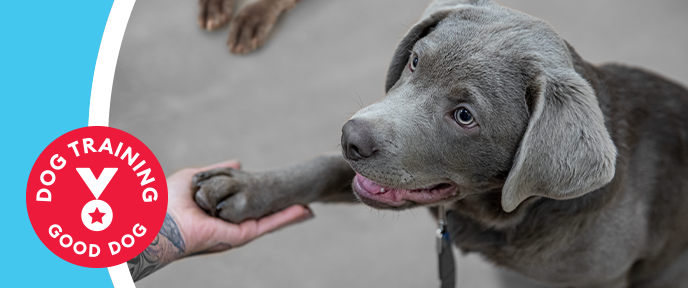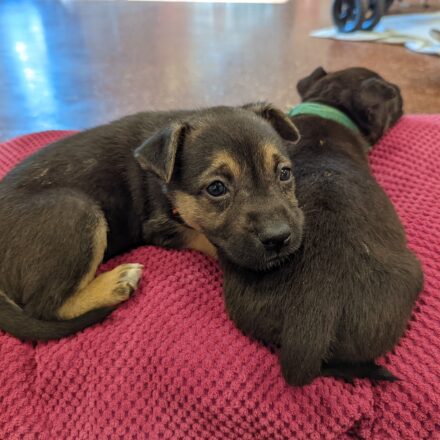Crucial Tips and Techniques for Learning Canine Training in the house
Grasping pet dog training in your home needs a tactical approach. Positivity, consistency, and perseverance are crucial parts. Establishing a regular assists create a feeling of safety and security for the pet. Utilizing positive reinforcement builds trust and interaction. Several proprietors struggle with preserving interest and involvement during training sessions. Recognizing how to navigate these obstacles can result in a lot more reliable training outcomes. What methods could be most helpful in overcoming these typical challenges?
Develop a Consistent Routine
When training a pet, developing a consistent routine is necessary for fostering etiquette and a solid bond between the owner and animal. An organized timetable gives dogs with a sense of safety, aiding them recognize what to anticipate each day. Regular feeding times, exercise, and training sessions produce a predictable atmosphere, which can minimize stress and anxiety and advertise a feeling of security.
Proprietors need to intend to include daily tasks at the very same time to reinforce this regimen. Morning walks, play, and training workouts should happen constantly. Furthermore, integrating commands and cues during these tasks can better improve discovering.
Use Positive Support
A regular routine prepares for effective training, yet the approaches utilized during training sessions greatly affect a pet's discovering experience. Positive reinforcement becomes a powerful tool in forming wanted habits. This method includes compensating a pet dog for exhibiting specific activities, efficiently encouraging them to repeat those behaviors (Dog Training Near Me). Incentives can include treats, appreciation, or playtime, developing a positive organization with the action executed
Using favorable reinforcement cultivates a bond of count on in between the pet dog and trainer, improving communication and understanding. It is critical to provide rewards quickly after the preferred actions to strengthen the link. Consistency in using this technique ensures the pet can clearly link the behavior with the incentive. Additionally, staying clear of punishment or unfavorable support can result in an extra passionate and positive student. By concentrating on positive reinforcement, instructors can create a helpful setting where dogs prosper and find out efficiently.
Maintain Training Procedure Short and Fun
Effective canine training requires maintaining sessions brief and interesting to preserve the dog's interest and excitement. Usually, sessions need to last no longer than 10 to 15 minutes, as canines have restricted focus periods. By concentrating on quick intervals, trainers can stop frustration for both the trainer and the pet dog, boosting the finding out experience.
Incorporating play and favorable communications right into training can make sessions enjoyable. Using toys, treats, or appreciation as rewards not just encourages the pet but also reinforces the bond in between the pet dog and instructor. Transforming tasks regularly can additionally aid maintain the dog's rate of interest to life, as different jobs stimulate psychological engagement.
Additionally, ending each session on a positive note, such as commemorating a little success, assures the dog associates training with enjoyable. Ultimately, keeping training sessions delightful and brief promotes efficient understanding and strengthens the total training procedure.
Establish Realistic Goals
Establishing practical goals is essential for effective pet dog training. Fitness instructors must begin by evaluating their pet's current skills and behavior tendencies, enabling them to establish possible purposes. Instead than aiming for complex commands, beginning with basic signs like "sit" or "remain" can promote a sense of success.
In addition, damaging down bigger objectives into smaller sized, workable actions aids keep motivation for both the pet dog and the instructor. This approach likewise permits for adjustments along the method, making certain that difficulties do not come to be frustrating.
In addition, it is very important to acknowledge that each canine discovers at its very own pace; patience is essential. Maintaining assumptions based assists avoid stress and urges regular progress. Dog Training Near Me. In conclusion, establishing reasonable goals not only boosts the training experience click here to find out more however additionally enhances the bond in between the dog and the fitness instructor, leading to a more efficient and harmonious training journey
Mingle Your Canine
Accomplishing reasonable training objectives prepares for an all-around canine, yet socializing plays a substantial function in a pet dog's growth. Socializing a dog involves subjecting it to various atmospheres, individuals, and other animals, which aids to build self-confidence and reduce stress and anxiety. Early socialization, ideally between three and fourteen weeks old, is necessary for shaping a pet's actions and personality. This direct exposure enables pet dogs to discover proper communications and establish important social abilities.
Owners should present their dogs to various situations progressively, ensuring each experience is satisfying and positive. Visiting parks, attending pup courses, or setting up playdates with various other dogs can facilitate these communications. In addition, finding out and observing other dogs from their behaviors can further improve a canine's social skills. Eventually, positive and regular socialization fosters a well-adjusted canine that easily navigates various social settings throughout its life.
Be Patient and Persistent

Furthermore, persistence is essential. Routine technique strengthens commands and habits, ensuring that the pet dog keeps what has actually been learned. It is essential to commemorate tiny victories, as they encourage both the owner and the dog to maintain progressing. Acknowledging problems as part of the trip instead than failures can assist keep motivation. Eventually, a patient and persistent strategy not just constructs a stronger bond between dog and owner yet likewise lays the structure for efficient training and long lasting obedience.

Integrate Training Into Daily Life
Incorporating training into life can enhance a pet dog's knowing experience. Routine tasks, such as feeding or walking, present useful opportunities for positive reinforcement. By seamlessly mixing training with everyday actions, proprietors can cultivate much better behavior in their pet dogs with time.
Daily Routine Combination
Exactly how can canine owners flawlessly mix training into their everyday routines? By incorporating training sessions right into daily activities, proprietors can improve their pet dog's learning experience. Straightforward commands can be practiced throughout strolls, such as "rest" prior to crossing roads or "heel" while navigating through parks. Feeding time provides another chance; proprietors can integrate commands like "wait" or "leave it" prior to providing the food dish. In addition, playtime can serve as a training school for commands like "fetch" or "drop it." Consistency is key; by embedding training into regular activities, canines learn that commands are pertinent in various contexts. This strategy not just strengthens knowing yet also reinforces the bond in between the dog and its proprietor.
Favorable Reinforcement Opportunities
Educating opportunities abound throughout a pet's every day life, especially when incorporated with positive support techniques. Daily tasks Continued offer moments for training, such as throughout strolls, feeding times, or play sessions. For example, awarding a pet for resting before getting food improves obedience while cultivating a favorable organization with commands. Likewise, praising a pet for steadly greeting visitors reinforces preferable actions. Integrating training right into play, like using fetch to practice commands, can also work. Owners must stay regular, utilizing deals with, praise, or playthings as incentives to urge excellent actions. By incorporating training flawlessly into day-to-day routines, proprietors can grow a well-behaved canine while enhancing their bond, making the training process satisfying for both parties.
Often Asked Inquiries
What Age Is Finest to Beginning Training My Dog?
Determining the ideal age to start home educating a canine varies; nevertheless, experts usually suggest beginning around eight weeks. Early training fosters socializing, establishes regimens, and assists form favorable habits, advertising a well-adjusted, obedient companion.
Exactly How Can I Stop My Dog From Barking Excessively?
To minimize excessive barking, one reliable approach includes determining triggers, offering consistent training commands, and rewarding silent actions. Furthermore, routine exercise and psychological excitement can assist reduce unnecessary barking by resolving monotony or anxiousness.
What Should I Do if My Pet Dog Ends Up Being Aggressive?
When a pet dog displays aggressiveness, it is important to stay calm and stay clear of conflict. Determining triggers, seeking specialist help, and using positive support techniques can successfully take care of and minimize aggressive behavior in dogs.
Just how Do I Select the Right Training Devices?
Selecting the right training devices includes examining the canine's training, temperament, and dimension objectives. Study different options, seek advice from specialists, and prioritize humane, reliable tools that promote positive support for an effective training experience.

Can I Train My Pet Dog Without Specialist Aid?
Educating a pet dog without professional help is practical for many owners. With dedication, perseverance, and constant method, people can properly teach basic commands and strengthen favorable behaviors, cultivating a solid bond in between them and their family pet.
A constant routine lays the foundation for effective training, yet the approaches used throughout training sessions considerably influence a pet dog's discovering experience. Reliable pet dog training calls for keeping sessions brief and appealing to keep the dog's attention and interest. Accomplishing sensible training goals lays the groundwork for an all-around canine, but socializing plays a significant function in a pet's advancement. Additionally, learning and observing various other dogs from their behaviors can further boost a pet's social skills. Picking the ideal training tools entails evaluating the pet's training, personality, and dimension objectives.